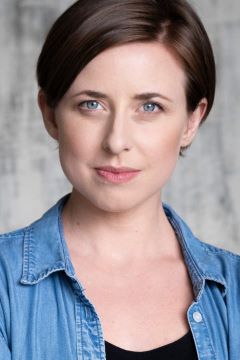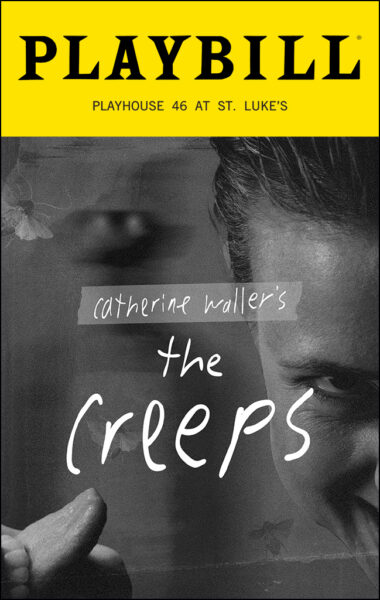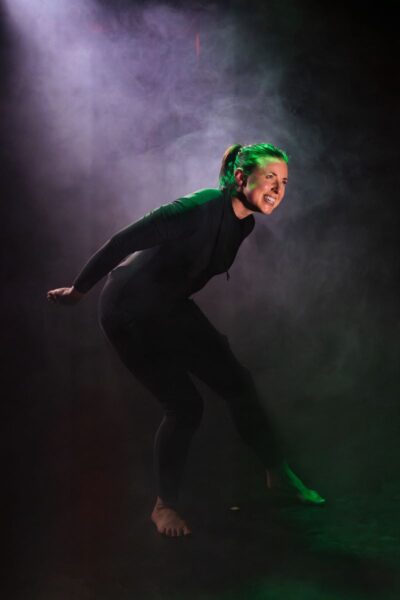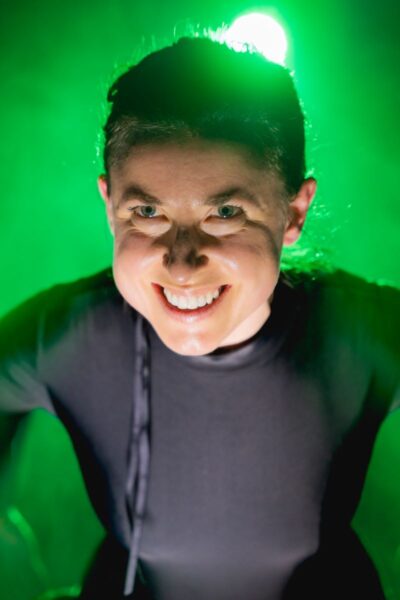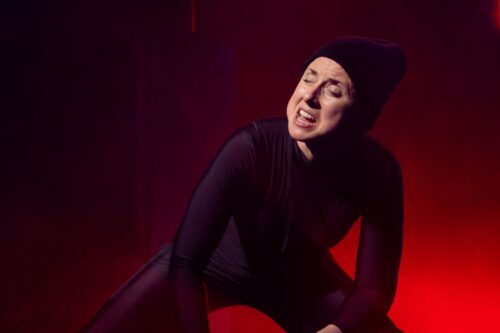A WALLER OF STRENGTH
The Creeps is a one-woman show created by and starring Catherine Waller, a native of Auckland, New Zealand. At Playhouse 46 at St. Luke’s, an intimate black box arena configuration that’s only a few rows deep, be prepared for six creeps onstage to speak directly to you. And they’ll expect a response. (Maybe even jewelry.) The audience is encouraged to talk back, but please don’t get carried away’”the performance is only 70 minutes, and there’s a fine line between hearing from an audience member and hearing too much. When you witness how captivating and creepy Ms. Waller is, you won’t want too many interruptions to rob you of her time.
With an effective light design by Scott Monnin, and an intended intrusive self-aware sound design by Hidenori Nakajo, Ms. Waller gives a powerhouse performance that will feed an audience with non-conventional and non-commercial tastes. But hurry, her limited run is only through November 5, 2023. Stage and Cinema’s Gregory Fletcher spoke with Ms. Waller about bringing her creeps to New York.
GREGORY FLETCHER: What was the original intent that triggered the creation of this piece?
CATHERINE WALLER: A bit of magic, fate, and practicality. I trained at the New Zealand National Drama School and as part of our final year, everyone graduating had to devise a 20-minute solo piece. The year before, I came to New York City for the first time, and saw Mary Poppins on Broadway. I was very impressed and enthralled by the level of performance’”the triple threats of acting, singing, and dancing. Knowing they were doing that three-hour show, eight times a week really blew me away. I became very interested in how I could become that good, and how I could perform at that level of athleticism. Then this kind of magical thing happened at the very end, after the curtain call, singing “Supercalifragilisticexpialidocious.” They began to create this game with us, the audience. Every time we thought the song was going to end, they would change key and sing it higher. They were giving us every ounce of whatever energy they had left, and they were red-faced with exhaustion, and then all of a sudden, I’ll never forget it, like in slow motion, the man playing Bert and one of the chorus members stopped and looked at each other, shaking their heads with a smile, as if to say, We have to finish the show. The key changed again, and they hit this high note and, I swear there was this pop of energy that hit me in the face like a tidal wave. I remember thinking to myself, what the heck just happened? To be so athletic, at that level of performance and mastery, in which some kind of transcendence emerges and an actor disappears into a role’”I’ve been interested in that ever since.
I went back to school and began to develop my solo piece. As I started to make the work, I was very surprised by the kind of odd, unique freak show that emerged. It arose out of the physicality in which I was working and with tones of darkness, psychology, and empathy’”all the things I’m very interested in as a writer.
FLETCHER: The last thing I expected to hear was that Broadway’s Mary Poppins inspired The Creeps. But at the same time, your comments about being an athlete, and losing yourself within a character’”absolutely, I see it now. You physically and vocally transformed within each role; I noticed even your face changed with each new personification. At times, I questioned if that was the same actor, but obviously it was because you never leave the stage. The impetus of the journey of those characters felt like an Olympian feat. Your stamina was awe-inspiring. Your thighs alone must be burning by the end of a performance. How do you prepare for such a thing?
WALLER: My stage manager timed how long I’m sitting in that squat. 15 minutes! I had no idea. I’m just in the moment, totally oblivious. But yes, how do I train for it? I’m active in my life, so I usually keep to a regime. I really need to listen to my body through rehearsal because I can’t push it. I never want to go so far that I exhaust myself. Mostly it’s strength training and flexibility. And a lot of vocal warmups, which is important for the show, because each character’s voice sits in a very different range. Luckily, I’ve been able to perform the piece over the years, so I’ve become practiced at knowing the hooks into the characters. Like knowing if I sit in that squat and bend down, I can rest my elbow against my leg, and that helps me find Bill’s voice.
FLETCHER: Which other artists have influenced you in creating your work?
WALLER: Oh gosh, I am such a starstruck geek when it comes to good storytelling. I think it’s one of the most amazing, wonderful things I could do with my life. It’s really the only thing I want to do. And so, I’m always inspired by many people. Darren Aronofsky, the filmmaker who made Requiem for a Dream, Black Swan, and recently, The Whale, his work has always resonated with me. He creates really dark stories, but it’s never darkness for darkness sake. There’s always a strong heart at the core of his work. Ellen Burstyn, the extraordinary actress (also in Requiem for a Dream), Cate Blanchett, Jessica Chastain, they’re chameleons even when they’re being naturalistic. They are also producers of their own work. Jodie Comer in Prima Facie’”at the end of it, I felt like I was in the presence of greatness. Simon McBurney’s The Encounter, his solo show, after which I thought to myself, Well, this is what’s possible for solo theatre. Game on!
FLETCHER: After seeing your work, I have to ask, no Eastern European influences?
WALLER: Actually, yes. And from central Europe as well. I was very lucky to be taught by teachers I continue to be in touch with from Drama School. My movement teacher had trained at School Jacques Lecoq in France’”I’m utterly grateful for all of what we learnt. Tom McCrory — he taught us mask work, Clown, and Bouffon, which is a really dark form of clown work. He was such a pillar of my training. Heather Timms, Jonty Henry, and the initial director of all our 20-minute solo works, Sophie Roberts. She really helped coax out the uniqueness of what began with The Creeps. As well as D’Arcy Smith, my vocal teacher. I still do his vocal warmups to this day.
FLETCHER: You’ve performed The Creeps at many international festivals, (and have been awarded many prizes, deservedly so), has the piece changed very much from when you first premiered ’til now?
WALLER: Certainly from drama school, but about four years later, I started to rework The Creeps. In drama school, it was very much a freak show, like a traveling circus. And organically it became a derelict brothel, like it was a cabaret. As you turn a corner, you go downstairs and pay a little extra, like a strip club somewhere, and you can get a lot more, and so it became this different world. Over the years, I’ve grown up, and, politically, things have impacted our society. That’s also influenced the piece. What’s really been speaking to me currently is this: we all deal with things, and some people (for whatever reason) and it may be no fault of their own, random or fate, there’s a whole array of reasons why people end up where they are. That’s just so humbling to me. The very real thing that we walk past every day, people struggling with addiction’”I don’t even pretend to know what they’re dealing with. Performing in Hell’s Kitchen, next to Port Authority and Times Square, we’re constantly living and walking amongst the underbelly. This has really been what’s speaking to me here, and I hope speaking through the piece.
FLETCHER: In the performance last night, an audience member asked a very specific question about the daughter of the character Bill. And you took the question in, considered it, and answered him about her death. Was this backstory you intended to share? Would it have eventually come out or was it purely because of the audience member’s question?
WALLER: I always mention his daughter and her death, yes, but I don’t always name the kind of cancer she had. Audience questions can change the order of information I share. If someone yells out, “Where is she?” I can’t ignore that. I’m a bit more practiced now at trying to coax people to engage, and usually it’s easier when I’m talking about lighter things.
FLETCHER: Your connection with the audience and the way that you’re hyperaware of sounds around you’”the way that you listen and how it affects your words’”it’s an amazing act to witness. I commend you on that. Since you do encourage the audience to talk back, has that request ever backfired?
WALLER: Last night, there was a lot of vocal questions from one particular man, and that’s a time when I have to push on. Usually, I’m very encouraging because the opposite can happen, too. People can feel very timid and shut down, and that creates a very different tone in the show. If people are more chatty, it begins lighter, and they feel a bit more safe to enjoy themselves. Because the themes are so dark, if there isn’t participation, I have to be very cautious of ensuring that the audience is with me. If they’re very quiet and timid, it’s a very different show. I have to try my best to keep people with me and not push them away. If an audience feels uncomfortable, they can really shut off, so that’s why I encourage talk, and it rarely backfires.
FLETCHER: You handled that man really well last night, and especially when he interrupted the flow of a joke you were telling. You said, “I’m in the middle of a joke.” And you were right, it wasn’t the time, but clearly he wasn’t listening to the room. You didn’t give him as much as the audience wanted to give him! Are New York audiences different from others in different parts of the world?
WALLER: It’s honestly been so similar. It’s such an interesting thing. If the audience feels a bit more emboldened to talk, ready and amped for something a little off kilter, the experience has been similar no matter where I am. I think it depends on the vibe of the audience night to night, a very interesting phenomenon.
FLETCHER: I noticed in the program that no director is credited. Who acts as your outside eyes?
WALLER: I never credited myself as the director because back in the day it was always just my show. I created it, wrote it. Now, I’m working with my designers, my collaborators, my team, the stage managers, my executive producer, Sharon Fallon; General Manager, Martin Platt. Before this, friends of mine gave me notes and responses. Expats from New Zealand who moved to Los Angeles and New York. Actors mostly, many of them went through my school. We have this very wonderful, shared language when it comes to creating theater. These are the people that I would always go to and ask for their input.
FLETCHER: Do you normally perform it in the round?
WALLER: That is 100% brand new. It’s always been proscenium, and that has been a very interesting nuance to work with. I actually changed a couple of the scenes before you saw it last night, because I found that when I got a little too close to the audience, there wasn’t a safety barrier between us. So, I changed a couple of things to keep myself more center, and I think that really helped. The audience connected more, rather than feel afraid or uncertain. The proscenium always provided a divide. The audience knew their place and the characters knew theirs. People could let their guard down a bit more. But in the round, it’s so much more immersive. I really enjoy doing it in this configuration because I find that it creates a whole other element of another dimension. And a little bit of a play on a circus.
FLETCHER: After seeing it staged in the round, I can’t imagine it in a proscenium setting. This way feels very right to me. What’s next for The Creeps?
WALLER: We’re planning our tour to the UK. And probably around the US. I also write and produce film and television. I have a collaborator in New Zealand, and we work together on a lot of film projects. We have a feature film currently in post-production, happening simultaneously to this. I love having my hands in every aspect of the creative process, and I really love producing and making work. And having it all come to life. As well as acting. I like doing it all. That’s what I plan to continue doing.
FLETCHER: Sounds like a great life. Thank you for sharing The Creeps with New York. It’s so different from anything else playing here. It’s a great opportunity for audiences who really want to see something alternative, that’s not so commercial or conventional’”for those who want something a little bit more experimental and, well, creepy.
photos by Andrew Patino
The Creeps
Playhouse 46 at St. Luke’s, 308 W 46th St
plays a limited nine-week engagement
Mon & Thurs at 7; Fri at 8; Sat at 3 & 8; Sun at 3
ends on Nov. 5, 2023
for tickets ($67 – $107 including fees), visit The Creeps
follow @thecreepsshow on Instagram and @thecreeps_show on TikTok
follow Catherine @catherinewallerofficial on Instagram.
find Gregory Fletcher at Gregory Fletcher, Facebook, Instagram, and from your iPhone only Threads.
